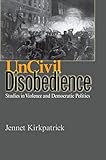Uncivil Disobedience : Studies in Violence and Democratic Politics / Jennet Kirkpatrick.
Material type: TextPublisher: Princeton, NJ : Princeton University Press, [2008]Copyright date: ©2009Edition: Course BookDescription: 1 online resourceContent type:
TextPublisher: Princeton, NJ : Princeton University Press, [2008]Copyright date: ©2009Edition: Course BookDescription: 1 online resourceContent type: - 9780691138770
- 9781400828869
- 303.6 20973 22
- HN90.V5 K53 2008eb
- online - DeGruyter
- Issued also in print.
| Item type | Current library | Call number | URL | Status | Notes | Barcode | |
|---|---|---|---|---|---|---|---|
 eBook
eBook
|
Biblioteca "Angelicum" Pont. Univ. S.Tommaso d'Aquino Nuvola online | online - DeGruyter (Browse shelf(Opens below)) | Online access | Not for loan (Accesso limitato) | Accesso per gli utenti autorizzati / Access for authorized users | (dgr)9781400828869 |
Frontmatter -- Contents -- Acknowledgments -- Introduction. Warts and All -- Chapter One. Violence, American Style -- Chapter Two. Frontier Vigilance Committees -- Chapter Three. Southern Lynch Mobs -- Chapter Four. Militant Abolitionists -- Conclusion. A Nation of People or Laws -- Sources Cited -- Index
restricted access online access with authorization star
http://purl.org/coar/access_right/c_16ec
Uncivil Disobedience examines the roles violence and terrorism have played in the exercise of democratic ideals in America. Jennet Kirkpatrick explores how crowds, rallying behind the principle of popular sovereignty and desiring to make law conform to justice, can disdain law and engage in violence. She exposes the hazards of democracy that arise when citizens seek to control government directly, and demonstrates the importance of laws and institutions as limitations on the will of the people. Kirkpatrick looks at some of the most explosive instances of uncivil disobedience in American history: the contemporary militia movement, Southern lynch mobs, frontier vigilantism, and militant abolitionism. She argues that the groups behind these violent episodes are often motivated by admirable democratic ideas of popular power and autonomy. Kirkpatrick shows how, in this respect, they are not so unlike the much-admired adherents of nonviolent civil disobedience, yet she reveals how those who engage in violent disobedience use these admirable democratic principles as a justification for terrorism and killing. She uses a "bottom-up" analysis of events to explain how this transformation takes place, paying close attention to what members of these groups do and how they think about the relationship between citizens and the law. Uncivil Disobedience calls for a new vision of liberal democracy where the rule of the people and the rule of law are recognized as fundamental ideals, and where neither is triumphant or transcendent.
Issued also in print.
Mode of access: Internet via World Wide Web.
In English.
Description based on online resource; title from PDF title page (publisher's Web site, viewed 08. Jul 2019)


